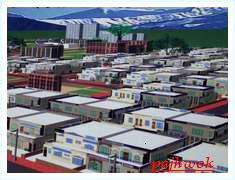KABUL): A joint investigation has produced overwhelming evidence of a proliferation of poorly constructed, illegal townships across the country with efforts ongoing to execute more housing schemes on usurped lands. There are multiple agencies at work and unable to check the rot despite proof of culpability.
Independent Afghan media have come together to investigate human rights and corruption issues in Afghanistan. This is the first of 24 reports that will be published simultaneously by the six partners of IMCP-Independent Media Consortium Productions.
The six media partners of the Independent Media Consortium (IMC) are Pajhwok Afghan News PAN), Killid radios, Radio Nawa Network, Killid print media (Killid, Morsal and Sapeda), Hasht-e-Subh (8AM) and Saba TV. IMC was created in March 2012.
Those disseminating this first report are PAN (reaching over three hundred media clients), Killid and Nawa radios (broadcasting in twenty one of the thirty four provinces), Killid weekly (distributed throughout the country) and 8AM (national daily with a circulation of 22,000 copies in eighteen provinces.)
The IMCP report that has been put together by Pajhwok’s Meer Agha Nasrat Samimi shows dozens of housing schemes have been executed in Kabul and other provinces either in gross violation of the relevant rules or on encroached land. IMCP is the production component of IMC.
High Office of Oversight and Anti-Corruption chief Azizullah Ludin says documents of most of townships are forgeries and that there are 355 townships in the country whose documents should be investigated.
The draft prepared by the Afghanistan Land Authority assessing the seizure of government and private lands (copy is available) says 986,334 jeribs (5 jeribs are one hectare) of public land has been grabbed.
The report prepared by the Special Commission on Extortion of Townships and City Properties in August 2012 states the grabbers are powerful warlords and commanders, high-ranking government officials, Cabinet members and wealthy people who have earned money illegally and through drug smuggling.
Owners and Buyers
Habibullah Nasiri, who assists Hezb Musharekat Milli (National Partnership Party) led by Najibullah Kabuli (a township owner), said Kabuli possessed legal documents of the land on which Nejat Mena Township had been constructed. “Najibullah Kabuli is out of the country. He has told the Attorney General’s Office that he can provide the required documents because the land belongs to him and his cousins,” Nasiri said.
One of the investors in Gulbahar Tower Township says they have legal documents of the land on which the township has been built. He also says they had initiated the scheme in agreement with the Cabinet and court and the work permit is being processed with Kabul municipality.
A Kabul resident, who has bought a plot in Mullah Ezat Township, says “If the government intends to demolish illegal buildings, it has to destroy the entire city.”
He said people purchased lands in unplanned areas because the government did nothing to provide them with shelter after they returned home from neighbouring countries.
According to the report of Afghanistan’s Lands Office, illegal land-grabbers have usurped 230,810 jeribs and constructed 228 illegal townships on them throughout the country. There are details from Balkh, Herat, Nangarhar, Parwan and Ghazni.
Kabul municipality official Abdul Ahad Wahed says letters on every building constructed illegally have been sent to the interior ministry and the police stations concerned, but nothing has happened.
Copies of letters sent by Kabul municipality to the Ministry of Interior are available with IMC.
In a letter No. 484/670 dated 20 April 2010, the Kabul municipality has requested the Presidential Palace, Kabul police headquarters, 16th police district and Kabul National Security Office to help the municipality prevent the construction of Gulbahar Tower Township, but no step was taken.
Tawanmandi
Reports published by IMCP will be disseminated widely. Funding for the year-long media project has been granted by Tawanmandi, a programme that works to strengthen Afghan civil society through funding and capacity development support.
Tawanmandi aims to build a vibrant and inclusive civil society that is able to effectively engage with policy and practice at national and local levels in the areas of human rights, access to justice, anti-corruption, peace-building and conflict resolution, and media, together with gender, youth, and disability as crosscutting issues. The Killid Group is Tawanmandi’s core media partner
Within the same framework, IMCP is also launching from June news on the radio every hour and also a news magazine that will use as sources civil society organisations working on strategic issues. Produced by Killid radio and disseminated by Killid and Nawa radio networks, and a group of associated community radios, it will reach all Afghanistan.
The initiative includes information and communication workshops for civil society organisations, and for editors-in-chief on sensitive issues. All together IMCP will be creating a mechanism through which a “feed-journalistic packaging-dissemination” will expand Afghanistan’s news current narrow focus and ensure unprecedented outreach.
Visits: 31









GET IN TOUCH
NEWSLETTER
SUGGEST A STORY
PAJHWOK MOBILE APP